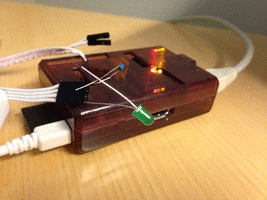mirror of
https://github.com/stianeikeland/go-rpio.git
synced 2025-01-23 02:31:05 +01:00
122 lines
4.3 KiB
Markdown
122 lines
4.3 KiB
Markdown
go-rpio
|
|
=======
|
|
|
|
Native GPIO-Gophers for your Pi!
|
|
|
|
**Documentation:** [](https://pkg.go.dev/github.com/stianeikeland/go-rpio/v4)
|
|
|
|
go-rpio is a Go library for accessing [GPIO](http://elinux.org/Rpi_Low-level_peripherals)-pins
|
|
on the [Raspberry Pi](https://en.wikipedia.org/wiki/Raspberry_Pi).
|
|
|
|
It requires no external c libraries such as
|
|
[WiringPI](https://projects.drogon.net/raspberry-pi/wiringpi/) or [bcm2835](http://www.open.com.au/mikem/bcm2835).
|
|
|
|
There's a tiny bit of additional information over at my [blog](https://blog.eikeland.se/2013/07/30/go-gpio-library-for-raspberry-pi/).
|
|
|
|

|
|
|
|
## Releases ##
|
|
- 1.0.0 - Supports original rpi A/B/B+
|
|
- 2.0.0 - Adds support for rpi 2, by @akramer
|
|
- 3.0.0 - Adds support for /dev/gpiomem, by @dotdoom
|
|
- 4.0.0 - Adds support for PWM and Clock modes, by @drahoslove
|
|
- 4.1.0 - Adds support for edge detection, by @drahoslove
|
|
- 4.2.0 - Faster write and toggle of output pins, by @drahoslove
|
|
- 4.3.0 - Adds support for SPI, by @drahoslove
|
|
- 4.4.0 - Support for disabling interrupts (workaround for #35), by @drahoslove
|
|
- 4.5.0 - Improve rpi 4 support, by @wfd3
|
|
- 4.6.0 - Adds Balanced PWM mode, by @youngkin
|
|
|
|
## Usage ##
|
|
|
|
```go
|
|
import "github.com/stianeikeland/go-rpio/v4"
|
|
```
|
|
|
|
If you're using an older go.mod incompatible you should instead use:
|
|
```go
|
|
import "github.com/stianeikeland/go-rpio"
|
|
```
|
|
|
|
Open memory range for GPIO access in /dev/mem
|
|
|
|
```go
|
|
err := rpio.Open()
|
|
```
|
|
|
|
Initialize a pin, run basic operations.
|
|
Pin refers to the bcm2835 pin, not the physical pin on the raspberry pi header. Pin 10 here is exposed on the pin header as physical pin 19.
|
|
|
|
```go
|
|
pin := rpio.Pin(10)
|
|
|
|
pin.Output() // Output mode
|
|
pin.High() // Set pin High
|
|
pin.Low() // Set pin Low
|
|
pin.Toggle() // Toggle pin (Low -> High -> Low)
|
|
|
|
pin.Input() // Input mode
|
|
res := pin.Read() // Read state from pin (High / Low)
|
|
|
|
pin.Mode(rpio.Output) // Alternative syntax
|
|
pin.Write(rpio.High) // Alternative syntax
|
|
```
|
|
|
|
Pull up/down/off can be set using:
|
|
|
|
```go
|
|
pin.PullUp()
|
|
pin.PullDown()
|
|
pin.PullOff()
|
|
|
|
pin.Pull(rpio.PullUp)
|
|
```
|
|
|
|
Unmap memory when done
|
|
|
|
```go
|
|
rpio.Close()
|
|
```
|
|
|
|
Also see example [examples/blinker/blinker.go](examples/blinker/blinker.go)
|
|
|
|
### SPI
|
|
|
|
#### setup/teardown
|
|
- `rpio.SpiBegin(rpio.Spi0)` has to be called first before using any Spi func. It will change pin modes to `Spi` and initialize default setting.
|
|
- `rpio.SpiEnd(rpio.Spi0)` should be called at the end, it will switch pin modes to `Input`.
|
|
|
|
#### transferring data
|
|
- `rpio.SpiTransmit(byte)` or `rpio.SpiTransmit(bytes...)` will transmit byte or bytes to slave.
|
|
- `rpio.SpiReceive(n)` will return n bytes received from slave.
|
|
- `rpio.SpiExchange(buffer)` will simultaneously transmit data from the buffer to slave and data from slave to the same buffer in full duplex way.
|
|
|
|
#### settings
|
|
- `rpio.SpiSpeed(hz)` will set transmit speed of SPI
|
|
- `rpio.SpiChipSelect(n)` will select chip/slave (ce0, ce1, or ce2) to which transferring will be done
|
|
- `rpio.SpiChipSelectPolarity(n, pol)` set chip select polarity (low enabled is used by default which usually works most of the time)
|
|
- `rpio.SpiMode(cpol, cpha)` set clock/communication mode (=combination of clock polarity and clock phase; cpol=0, cpha=0 is used by default which usually works most of the time)
|
|
|
|
## Other ##
|
|
|
|
Currently, it supports basic functionality such as:
|
|
- Pin Direction (Input / Output)
|
|
- Write (High / Low)
|
|
- Read (High / Low)
|
|
- Pull (Up / Down / Off)
|
|
- PWM (hardware, on supported pins)
|
|
- Clock
|
|
- Edge detection
|
|
|
|
It works by memory-mapping the bcm2835 gpio range, and therefore require root/administrative-rights to run.
|
|
|
|
## Using without root ##
|
|
|
|
This library can utilize the new [/dev/gpiomem](https://github.com/raspberrypi/linux/pull/1112/files)
|
|
memory range if available.
|
|
|
|
You will probably need to upgrade to the latest kernel (or wait for the next raspbian release) if you're missing /dev/gpiomem. You will also need to add a `gpio` group, add your user to the group, and then set up udev rules. I would recommend using [create_gpio_user_permissions.py](https://github.com/waveform80/rpi-gpio/blob/master/create_gpio_user_permissions.py) if you're unsure how to do this.
|
|
|
|
PWM modes will still require root.
|
|
|